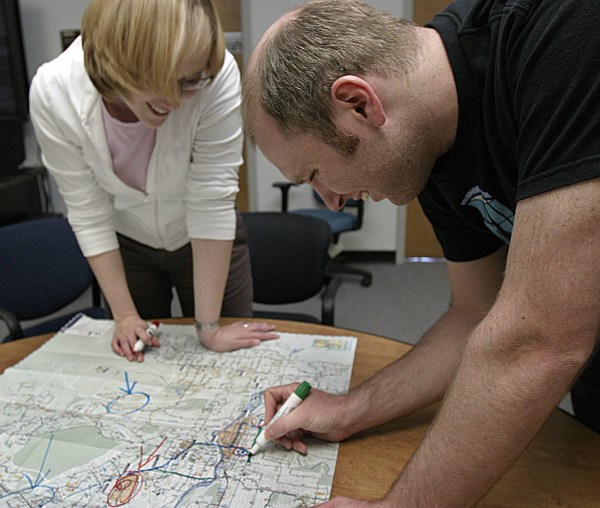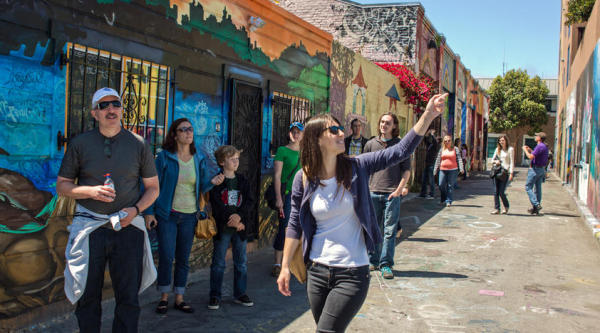How to travel with friends without killing each other
I’ve taken about a dozen trips with various groups of friends over the years, and many of them have been amazing. After all, these are people you choose to spend time with, so going somewhere together is only to make you closer right?
While it can be very fun to travel with friends, it’s important to remember a few details to make sure the trip doesn’t go south. These tips have helped me plan trips that go smoothly, without burnout or flared tempers.
1) The level of planning needed is proportional to the size of the group.

While planning for large groups is important, this group might mutiny after day 2
While this seems obvious, I’ve seen it go both ways. Large groups that are woefully unprepared and small groups overitinerized.
If I’m by myself, I can plan little, sprint through a city, see everything I want to see and still have time for a nap, coffee and casual dinner. Even with a single friend, we can often play it by ear and scheduling everything out is probably overkill.
With more people, your travel velocity decreases. The larger the group, the more time you’ll need to get anywhere and the more organization and communication tools you’ll need.
2) Plan ONE thing per day - the rest is optional

One is the friendliest number to keep people from burning out
To strike a balance, particularly for planning with larger groups, I employ the principle of doing ONE thing together each day, the rest of the plans being completely optional.
Energy levels differ. Adjustment to jetlag differs. Some people need more or less sleep than others.
There are people that need to visit every site on the tourist map and others that could care less.
There are people who really enjoy shopping and others that truly loathe it.
Making one thing mandatory and the rest optional gives everyone enough time to get what they need out of the trip without burdening the rest of the group while still spending plenty of time bonding over the same experiences.
3) Play to your strengths of your group - Divide and conquer

Since everyone’s travel style is a little different, I often use competing interests as an opportunity to divide and conquer the planning.
Some friends are wizzes at booking airfare and lodging (decisiveness helps!), Others are foodies and scout for great restaurants. Still others I can depend on for researching the nightlife or cultural options, taking us to places I never would have found on my own. Even better when someone in your group speaks the language.
Taking on all of the planning yourself can get exhausting, but if you know where your friends excel, it can really make a trip.
Conversely, don’t put your least organized friend in charge of complicated train schedules or your friend that goes to Chipotle every day in charge of making reservations or you may be sorely disappointed.
4) Travel like a tapa bar, not like an all-you-can-eat buffet - you can always come back
Pacing is key and I’ve seen a lot of people burn out because they just try to pack too much into their itinerary.
Cut a day trip if no one is really eager to go. Have a little of this and see a little of that, much like a tapa bar, but by your fifth church or museum I guarantee someone in your group will be checking out.
I try to always travel with the mindset that I can come back, with reasonable assurances that those things I didn’t see or do will still be there. It’s difficult to internalize, but this mindset will help you peel back the layers of a new culture or country and experience it in a much more fulfilling way.
5) Spend some time apart
It’s important to remember that even though you are friends, you aren’t used to spending nearly every continuous moment together for a week or longer.
Be sure to set aside time where you do your own things so that those idiosyncracies don’t get on each other’s nerves. Visiting a movie theater can help here.
It also may not dawn on you that your friends may not know each other as well as each knows you, so you may find yourself in the role of “relationship interpreter” to help them understand each other’s quirks and needs.
6) Keep in mind that budgets differ - Err on the side of free or necessary

To keep everyone in good spirits, make sure you keep budget in the back of your mind.
While that $500 scuba package or skydiving excursion sounds fun, it may not fit in everyone’s budget and may cause a lot of anxiety for someone.
I try to be conscientious and suggest activities that are free (say concerts in the park) or necessary (food-related, self-guided walking or biking tours that keep us active).
Weirdly enough, I often find that many of the really expensive activities like helicopter tours or bungee jumping can often be done closer to home for much less.
7) Rent an apartment over hotel rooms
Renting an apartment or house is a great way to spend more casual time together, reduces coordinating effort (one location - one reservation/check-in) and can save a boat load of money.
Hotels typically cater to either business travelers, couples or families but are not so optimal for groups of 4-8. I’ve even had situations where a suite upgrade reduces the occupancy of the room and the hotel has no way to accommodate the third or fourth person without downgrading us or charging for an extra room.
Renting an apartment or house allows people to have the amount of privacy they need without making it a chore to track down everyone in your group. They also tend to be way more flexible on check in and check out times, so it’s not a rush to pack everyone up, just to store luggage in the lobby until your train that evening.
The accommodations are also often far more memorable than your typical chain hotel.
8) Stagger your travel days to save money and sanity
I try to split up travel days so it doesn’t feel like you’re constantly on a train, plane or bus. Some people really don’t handle the transit as smoothly as others, so giving them time to recover is important. Sleeping on a train sounds fun until you do it too many times. I try to make sure that I get a chance to understand what it feels like to live in a particular city until I move on. Waiting in a train station or airport too often won’t let you experience the important things, though you may get to know your group better. It also gets costly to continuously buy tickets on a per person basis, though shared transit like a rental car often becomes more attractive. Typically any city becomes cheaper and cheaper the longer you spend in it.
9) Bring media and snacks - more than you think you need
On those days when your group does have to travel, be a hero and load up your laptop with media. I’ve had many delays fly by because we popped in a movie or watched an entire season of a TV show. Be mindful of others around your group as media can quickly become annoying in close quarters. For this reason, I often bring headphone splitters.
Likewise, for roadtrips, bring a long playlist, cassette tape adapter and AUX cable and you’ll be singing along in no time.
Finally, when energy levels dip, break out the snacks or steer the group to buy some. Hangriness can be a disaster for a group dynamic, so use the opportunity to sample local foods or poke around some street vending areas.
10) Use online tools and apps - particularly for tracking expenses
Lastly, make sure everyone is on the same page with an online itinerary and spreadsheet costs. Giving everyone in your group access to all of the addresses of accommodations, ticket/reservation numbers and a breakdown of costs will greatly reduce the anxiety and uncertainty of a trip. After enough, you’ll probably have your own templates to make that next trip even easier!

No comments yet.